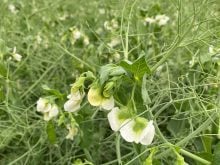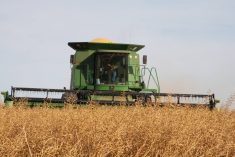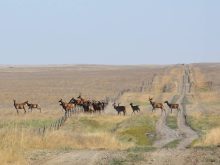RED DEER – Many consumers make sure they read the labels before buying food.
Lynne Hoff thinks they should do the same when buying horse feed and supplements.
Hoff, a pharmacist who raises performance horses on her Sunglade Ranch Ltd. near Sundre, Alta., said a feeding program must make sense, be good for the horse and be affordable and easy to use.
She told horse owners attending the recent Mane Event horse show in Red Deer that they must educate themselves and avoid “buying over priced alfalfa in a bag.”
Read Also

Crop quality looks good this year across Prairies
Crop quality looks real good this year, with the exception of durum.
She is not a nutritionist but has learned that good nutrition puts a bloom on a horse’s coat and the right supplements can help with overall health.
She does not want horse feed to contain fillers or additives such as artificial flavours and colours to make it more palatable.
“A product shouldn’t have molasses or any other sugars to get your horse to eat the product.”
Many people admit they use certain supplements because they saw them advertised, but Hoff said they probably deliver little benefit.
Every supplement is different, but a proper label should be in two parts:
• ingredient list – The first name on the list is the highest concentration in the product. The benefits may not be what the buyer expected if the first name is grain byproducts or dried meals;
• guaranteed analysis of nutrients – check for vitamins C and E, minerals such as zinc for joint health, and amino acids. For example, calcium and phosphorus are needed in the diet but they must be balanced and are only needed in small amounts.
Selenium prevents white muscle disease, but too much can be toxic. Chronic selenium overdose may cause hair loss. For example, locoweed concentrates selenium and is toxic to livestock.
“Too much is worse than too little,” Hoff said.
Too much protein may be hard for the horse to digest. Hoff said most grain and hay products contain enough protein and many horses do not do enough work to need high levels.
Horses also need fibre for proper digestion. They will probably take in enough in a natural grazing situation, but owners who must buy fibre should buy the best hay they can afford.
She also advises reading the label if buying probiotics for improved digestion. Live yeast products are best. They are more expensive but dehydrated products have no probiotic activity.















